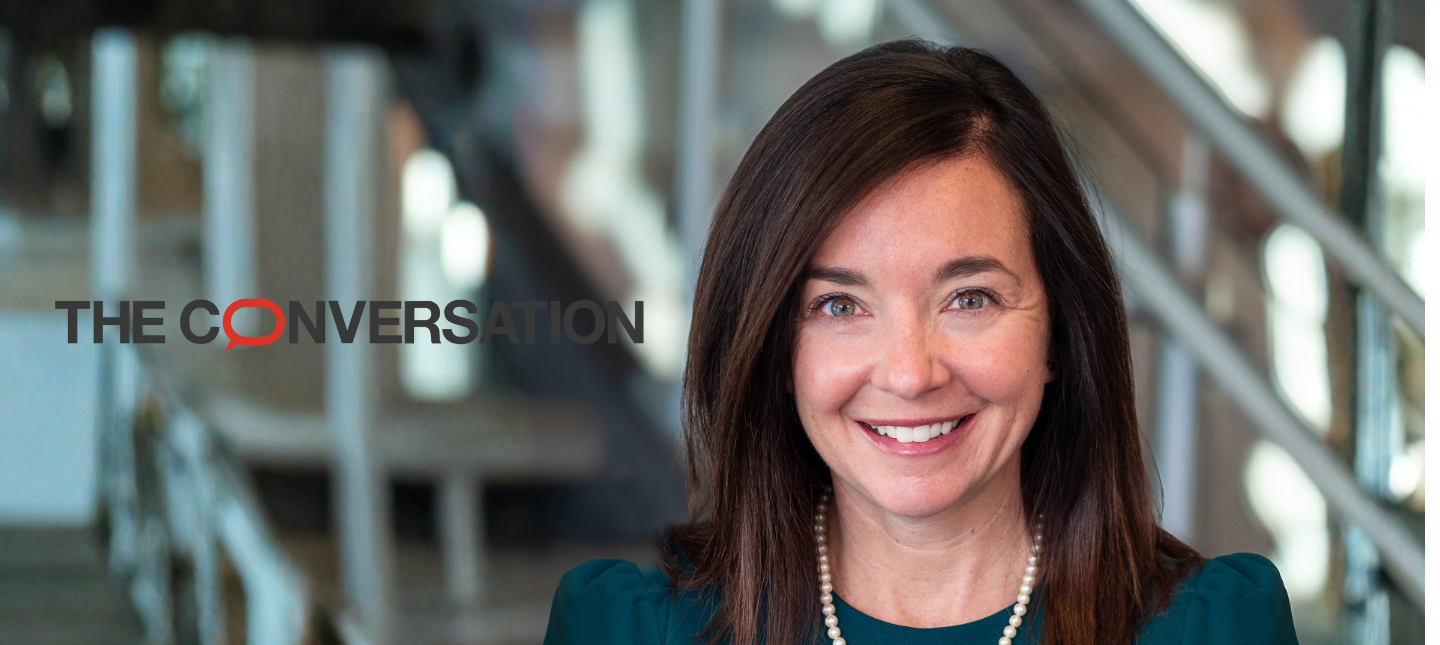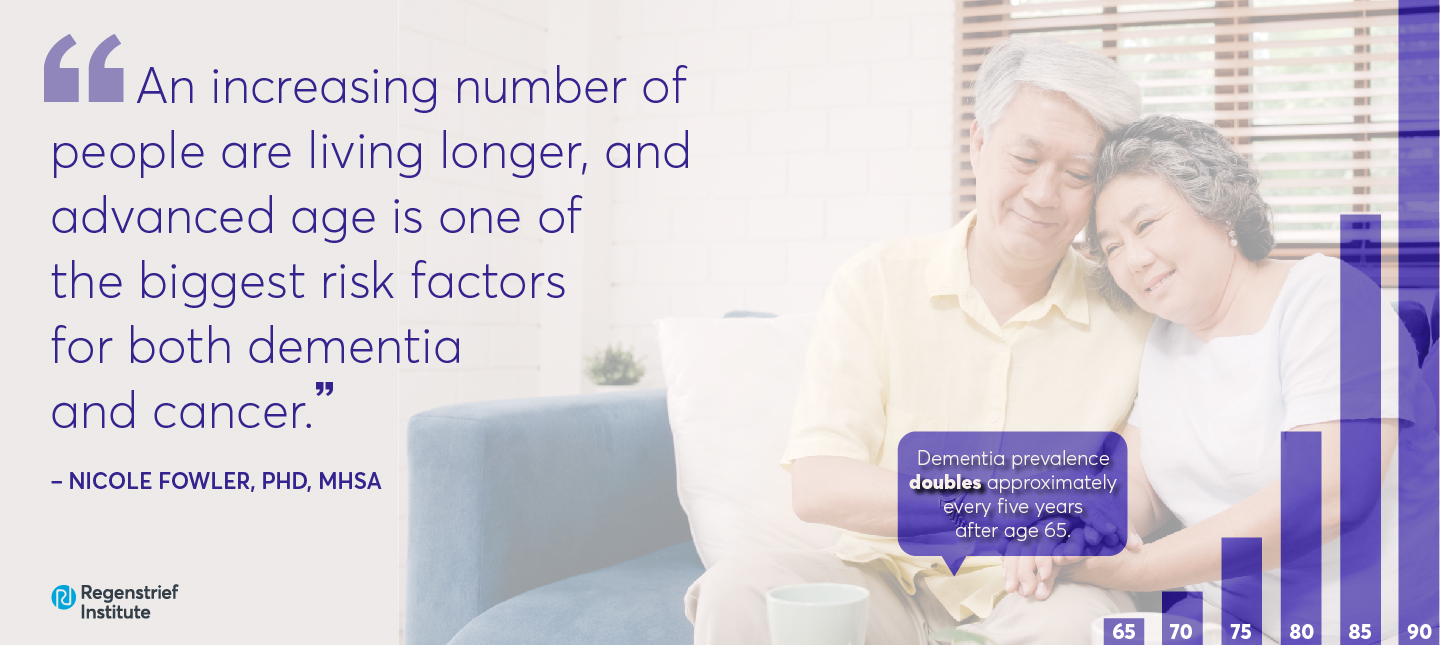Review authors make recommendations for treatment of cancer in patients with dementia
Pre-existing dementia complicates cancer care and increases the risk of worse clinical outcomes and inferior patient experience, according to a review of studies exploring the intersection of dementia and cancer. People living with dementia are more likely to have cancer diagnosed at an advanced stage and receive no or less extensive cancer treatment, which negatively affects survival after cancer diagnosis.
In addition to presenting an overview of dementia and cancer, the review authors, who are from the United Kingdom, Ireland and Australia, as well as the United States, make pragmatic recommendations for clinicians treating cancer in patients with dementia.
“An increasing number of people are living longer, and advanced age is one of the biggest risk factors for both dementia and cancer; the co-occurrence of these two diseases is increasing as the population ages,” said review co-author Regenstrief Institute and Indiana University School of Medicine faculty member Nicole Fowler, PhD. “It’s a tough scenario for patients, their caregivers and clinicians. People with dementia may not be able to describe symptoms that might alert a physician early-on to a developing or existing cancer. Also, screening for cancer and cancer treatment can add additional burden to patients with dementia and their caregivers.”
Dementia prevalence increases steeply with age, approximately doubling every five years after age 65.
“Few guidelines exist to support oncologists’ understanding of how best to talk with patients with dementia, identify their ability to participate in decision-making about cancer treatment and work with families to identify their goals for cancer care and treatment,” said Dr. Fowler. “Oncologists need to navigate carefully between under-diagnosis and under-treatment and over-diagnosis and over-treatment, ensuring that a dementia diagnosis informs, but doesn’t automatically rule out or specify, any particular course of action.
“Optimal cancer care for people living with dementia needs quality indicators and targets that recognize the patient’s functional status – a cancer patient with moderate cognitive impairment may be treated differently than someone in the end stage of the disease – and the personal preferences of the patient and family caregiver,” she added.
Supporting an individual living with dementia through cancer treatment and making care decisions contribute significantly to the caregiver’s burden, adding additional pressure to already stressful responsibilities.
The paper includes a dozen pragmatic recommendations for oncologists treating patients living with dementia:
- Identify pre-existing dementia in patients as soon as possible and document it in patient records.
- Involve caregivers and support their emotional, financial and other needs.
- Review decision-making capacity and legal decision-making powers as well as verify advance medical directives.
- Consider and make reasonable adjustments to cancer-related care and treatment.
- Minimize the risk of poorly controlled pain and other symptoms and side effects including dementia decline.
- Reduce the risk of emergency presentation for medical care.
- Increase dementia knowledge and training among cancer clinicians.
- Provide information and communicate in dementia-friendly ways:
- Use simple language, pictures and recap.
- Supply take-away summaries.
- Give warm, empathetic, non-verbal communication.
- Communicate directly with other involved clinicians and keep them updated.
- Allow more time for patients with dementia.
- Make clinical environments more dementia friendly.
- Minimize and improve care-related travel for people with dementia including remote and mobile care options and parking.
- Establish features, pathways and models of cancer care that support caring for people with dementia.
“Cancer care for people with dementia: Literature overview and recommendations for practice and research” is published in the peer reviewed CA: A Cancer Journal for Clinicians.
The authors note, “Protection from harm is an intensified concern because of the increased vulnerability of people living with dementia to the potential harms inherent in receiving cancer screening, diagnosis, and treatment and because of concerns about additional harms uniquely related to preexisting dementia.”
The authors conclude, “Coming years are likely to see cancer care for people with dementia become a bigger and more salient challenge because of population aging and as medical advancements (e.g., single blood test multicancer screening, targeted therapies with lower toxicity) potentially improve the feasibility and tolerability of cancer detection and treatment options. We make comprehensive recommendations for clinical practice and future research to help clinicians and providers deliver best and equitable cancer care for people with dementia and their families.”
Author List (As presented in the publication)
Laura Ashley PhD, School of Humanities and Social Sciences, Leeds Beckett University, Leeds, UK; Claire Surr PhD, Centre for Dementia Research, Leeds Beckett University, Leeds, UK; Rachael Kelley RMN, PhD, Centre for Dementia Research, Leeds Beckett University, Leeds, UK; Mollie Price PhD, School of Humanities and Social Sciences, Leeds Beckett University, Leeds, UK; Alys Wyn Griffiths PhD, Institute of Population Health, University of Liverpool, Liverpool, UK; Nicole R. Fowler MHSA, PhD, Indiana University Center for Aging Research at Regenstrief Institute, Indianapolis, Indiana, USA; Dana E. Giza MD, Joan and Stanford Alexander Division of Geriatric and Palliative Medicine, University of Texas McGovern Medical School, Houston, Texas, USA; Richard D. Neal MBChB, FRCGP, PhD, Department of Health and Community Sciences, Faculty of Health and Life Sciences, University of Exeter, Exeter, UK; Charlene Martin PhD, Department of Oncology and Metabolism, University of Sheffield, Sheffield, UK; Jane B. Hopkinson RGN, PhD, School of Healthcare Sciences, Cardiff University, Cardiff, UK; Anita O’Donovan PhD, Applied Radiation Therapy Trinity (ARTT), Discipline of Radiation Therapy, School of Medicine, Trinity St. James’s Cancer Institute, Trinity College Dublin, University of Dublin, Dublin, Ireland; William Dale MD, PhD, Center for Cancer and Aging, City of Hope Comprehensive Cancer Center, Duarte, California, USA; Bogda Koczwara BMBS, MBioethics, Department of Medical Oncology, Flinders Medical Centre & Flinders Health and Medical Research Institute, Flinders University, Adelaide, South Australia, Australia; Katie Spencer MB BChir, FRCR, PhD, School of Medicine, University of Leeds, Leeds, UK; and Lynda Wyld MBChB, FRCS, PhD, Department of Oncology and Metabolism, University of Sheffield, Sheffield, UK. To view the list in the article, go here.
About Nicole R. Fowler, PhD, MHSA
In addition to her role as associate director of the Indiana University Center for Aging Research at Regenstrief Institute, Nicole R. Fowler, PhD, MHSA, is also an associate professor of medicine at Indiana University School of Medicine, director of research for the Division of General Internal Medicine and Geriatrics, and an implementation scientist in the Center for Health and Innovation and Implementation Science.
About Regenstrief Institute
Founded in 1969 in Indianapolis, the Regenstrief Institute is a local, national and global leader dedicated to a world where better information empowers people to end disease and realize true health. A key research partner to Indiana University, Regenstrief and its research scientists are responsible for a growing number of major healthcare innovations and studies. Examples range from the development of global health information technology standards that enable the use and interoperability of electronic health records to improving patient-physician communications, to creating models of care that inform practice and improve the lives of patients around the globe.
Sam Regenstrief, a nationally successful entrepreneur from Connersville, Indiana, founded the institute with the goal of making healthcare more efficient and accessible for everyone. His vision continues to guide the institute’s research mission.
About IU School of Medicine
IU School of Medicine is the largest medical school in the U.S. and is annually ranked among the top medical schools in the nation by U.S. News & World Report. The school offers high-quality medical education, access to leading medical research and rich campus life in nine Indiana cities, including rural and urban locations consistently recognized for livability.








